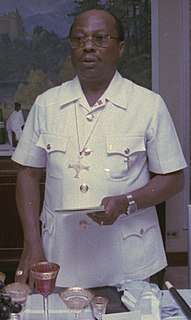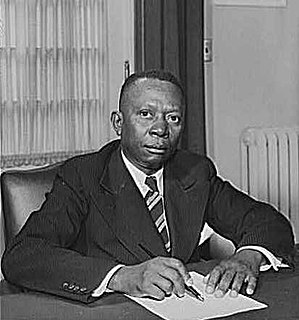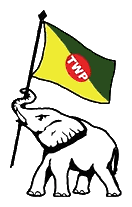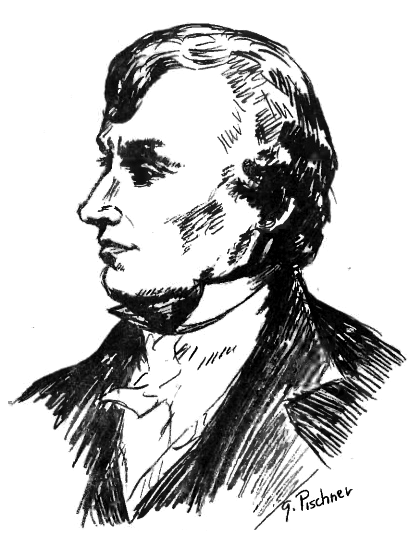
Politics of Liberia takes place in a framework of a presidential representative democratic republic modeled on the government of the United States, whereby the President is the head of state and head of government; unlike the United States, however, Liberia is a unitary state as opposed to a federation and has a pluriform multi-party system rather than the two-party system that characterizes US politics. Executive power is exercised by the government. Legislative power is vested in both the government and the two chambers of the legislature.

Samuel Kanyon Doe was a Liberian politician who served as the Liberian leader from 1980 to 1990, first as a military leader and later as a politician. Then Master Sergeant Doe served as chairman of the People's Redemption Council and de facto head of state after staging a violent coup d'etat in 1980; he killed President William R. Tolbert, Jr., and executed much of the True Whig Party leadership. Samuel Doe in turn was murdered by his conqueror, Prince Johnson, one time ally of Charles Taylor, in an internationally televised display.
Americo-Liberians, or Congo people or Congau people in Liberian English, are a Liberian ethnic group of African American, Afro-Caribbean and Liberated African descent. The sister ethnic group of Americo-Liberians are the Sierra Leone Creole people, who shared similar ancestry and related culture. Americo-Liberians trace their ancestry to free-born and formerly enslaved African Americans who emigrated in the 19th century to become the founders of the state of Liberia. They identified there as Americo-Liberians. Although the terms "Americo-Liberian" and "Congo" had distinct definitions in the nineteenth century, they are currently interchangeable and refer to an ethnic group composed of the descendants of the various free and ex-slave African American, Caribbean, Recaptive, and Sierra Leone Creoles who settled in Liberia from 1822.

The President of the Republic of Liberia is the head of state and government of Liberia. The president serves as the leader of the executive branch and as commander-in-chief of the Armed Forces of Liberia.

William Richard Tolbert Jr. was the 20th President of Liberia from 1971 until 1980, when he was killed in a coup d'état led by Samuel Doe.

The 2005 Liberian general election was held on 11 October 2005, with a runoff election for the presidency held on 8 November of that year. The presidency, as well as all seats in the House of Representatives and Senate were up for election. The election marked the end of the political transition following Liberia's second civil war and had been stipulated in the Accra Comprehensive Peace Agreement of 2003. Ellen Johnson Sirleaf, former World Bank employee and Liberian finance minister, won the presidential contest and became the first democratically elected female African head of state in January 2006.

The 1997 Liberian general election was held on 19 July 1997 as part of the 1996 peace agreement ending the First Liberian Civil War. The presidency, as well as all seats in the House of Representatives and the Senate were up for election. Voter turnout was around 89%. Former rebel leader Charles Taylor and his National Patriotic Party (NPP) won the election by a substantial margin; Taylor won 75.3% of the vote in the presidential election, whilst the NPP won the same number of votes in the parliamentary election. Taylor was inaugurated as president on 2 August 1997.

General elections were held in Liberia on 15 October 1985. These were the first elections since the 12 April 1980 military coup that brought Samuel Doe to power. During 1984, a new draft Constitutional referendum was approved, which allowed a 58 member civilian and military combined Interim National Assembly, headed by President Samuel Doe. The ban on political parties were lifted and four parties, namely, the President's National Democratic Party of Liberia, Liberian Action Party, Unity Party and Liberia Unification Party were in fray.
Sekou Damate Conneh, Jr. is a Liberian politician and former rebel leader.
William Vacanarat Shadrach Tubman Jr. is a Liberian politician and member of the Reformed United Liberia Party (RULP). He is the son of William Tubman, who was President of Liberia from 1943 to 1971, and the son-in-law of his father's successor, William R. Tolbert Jr., whose daughter Wokie he married.

The Vice President of the Republic of Liberia is the second-highest executive official in Liberia, and one of only two elected executive offices along with the President. The Vice President is elected on the same ticket with the president to a six-year term. In the event of the death, resignation or removal of the president, the Vice President ascends to the presidency, which he or she holds for the remainder of their predecessor's term. The Vice President also serves as the President of the Senate and may cast a vote in the event of a tie. The current Vice President is Jewel Taylor, serving under President George Weah. She began her term on January 22, 2018.

The 2011 Liberian general election was held on 11 October 2011, with a presidential runoff election held on 8 November 2011. The presidency, as well as all seats in the House of Representatives and half of the seats in the Senate, were up for election. The election was overseen by the National Elections Commission (NEC).

A referendum to amend the Constitution of Liberia was held on 23 August 2011. Voters chose whether to ratify four amendments regarding judge tenure, elections scheduling, presidential candidate requirements and the electoral system. The National Elections Commission of Liberia (NEC) oversaw the referendum.

General elections were held in Liberia on 4 May 1943 alongside a constitutional referendum. William Tubman of the True Whig Party was elected unopposed. He took office on 3 January 1944.

General elections were held in Liberia on 7 October 1975, alongside a simultaneous referendum on presidential term limits. In the presidential election, incumbent William Tolbert of the True Whig Party was the only candidate, and was re-elected unopposed. In the legislative elections True Whig Party candidates won all 71 seats in the House of Representatives and all 18 seats in the Senate unopposed. Voter turnout was around 80%.

Edison Reginald “Reggie” Townsend was a Liberian journalist and statesman known for the establishment of Liberia’s Information Services. He served as Secretary of Information and Cultural Affairs under President William V. S. Tubman, and as Minister of State for Presidential Affairs under President William R. Tolbert. In 1979 he was elected National Chairman of the True Whig Party. Following the 1980 Liberian coup d'état of President Tolbert on April 12, 1980, he and several other members of the Tolbert administration were put on trial and without due process executed by firing squad on April 22, 1980.















